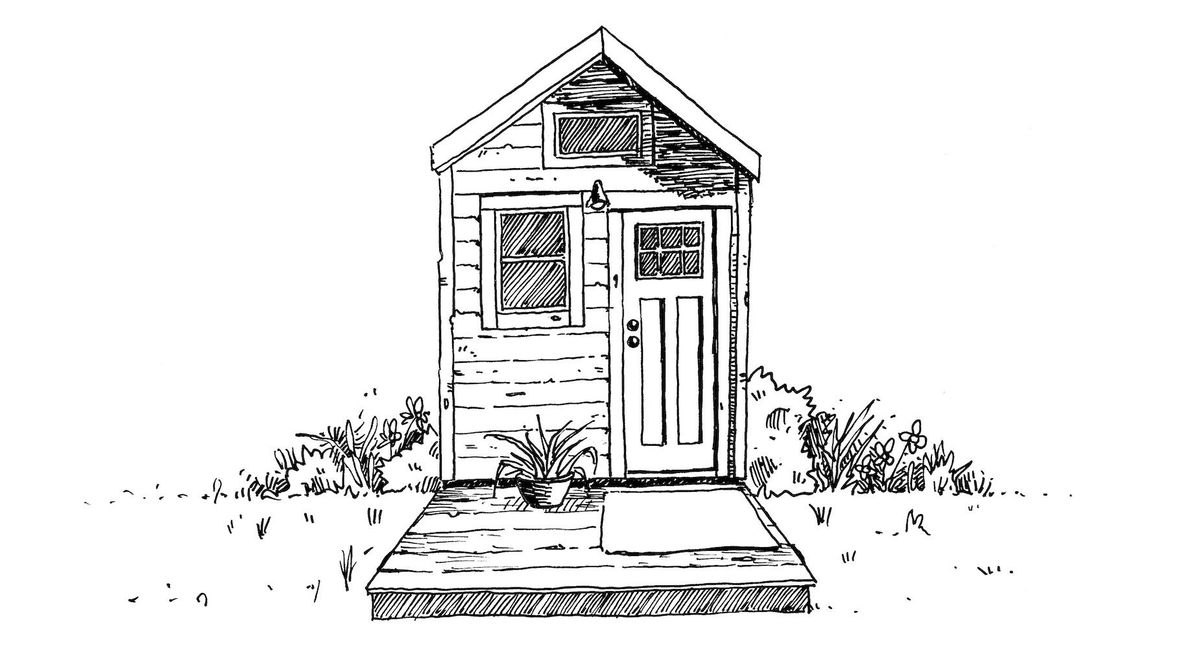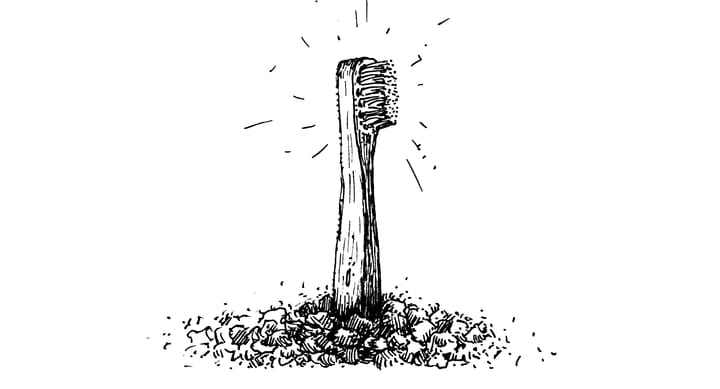Notes from a small house III
Rabbits, a smashed face, old cows, a demotivational speaker, and rabbits

Smash mouth
My partner Vic recently knocked out her front teeth. Again.
Sometimes people will injure a particular part of their body more often than others. For me, it’s the trapezius muscle (if I’m interpreting the anatomical diagram I’m looking at correctly). I have longer-than-average arms and hypermobile joints – who exactly assembled this strange robot? – and I often twinge part of the trapezius by overextending an arm, for example when reaching for some marshmallows on a high shelf.
The typical injury zone for Vic appears to be the front of her face. The first time Vic smashed her teeth, she was manoeuvring a bike into a parking position and the tyre hit something unexpected, bouncing the handlebars up into her face.
We were living at 276 Adelaide Road at the time, a dynasty Wellington flat that had been occupied by the same extended group of friends for over a decade.
One of our flatmates was Zoe. Zoe is a teacher, and not easily fazed. When someone tried to start a campfire on our cork floor during a party, to test out a flint firestarter they’d received as a gift, Zoe was more concerned about the fuss I was kicking up about it than the actual flames.
Zoe does believe it’s important, however, that people take care of their appearance.
When Vic arrived back at the flat after the bike incident, Zoe and I met her at the door.
“That looks okay,” I said, appraising the gap in her smile. “It’s not so bad.”
“Don’t listen to Rich,” said Zoe. “It is that bad, and you need to get it seen to straight away.”

The more recent face-smashing incident was worse. Vic was on a stand-up paddleboard, slipped forward, and slammed her mouth on the paddle. Each of the front teeth broke off partway down, and the fracture line extended inward and upward, parallel to the jaw line. The remaining pieces of teeth visible from the front were merely thin shells of enamel with little tooth behind them.
I still thought it was okay, when I saw the teeth. It did add a subtle whistle to some of Vic’s phrases. That was new. But surely it was only temporary. For Vic, even to wait the 24 hours to get a dentist appointment was too long. She curled her lips over her teeth to cover them. The shards of enamel worried at her tongue.
The dentist Vic went to see, an American guy, said that he didn’t want to start with crowns. It felt wrong to grind down the teeth of someone still relatively young.
Vic came home with some newly capped teeth within the hour. You can barely see the line between the real teeth and the stand-ins.
Vic and I talked about how dentists are so fast and upbeat these days. Well, the good ones.
A colleague at work told me that the best kind of dentist is a quiet, assured nerd, someone who utterly knows what they’re doing. Conversation skills are optional. Talking during dentistry is nigh on impossible anyway.
Old cow
Vic had to chew carefully for a few days.
We both had our mouthes full when our six-year-old daughter Ida moved from talking about wanting to be a vet to asking where different kinds of meat came from.
Vic and I both paused mid-chew, wondering whether our recent barbeque purchase was about to be made redundant.
We had a similar conversation with our son when he was about four, but of a different flavour: he had been under the impression that chicken, which he loved to eat, was a plant, and was incensed to learn that he had been eating it under false pretences.
Ida likes eating meat, but she also loves animals. Before she said she wanted to be a vet, she said she would be a farmer.
We have chickens, some which Ida and Neko raised from chicks. She and her brother Neko feed them every day, and collect their eggs. The kids are particular about the eating of their eggs. Neko will only eat the yolk, and Ida will only eat the white. Preparing food for such preferences is a little annoying, but at least we have the whole egg covered.
“I’m only going to eat cows now,” Ida declared, after mulling it over for a bit. “Because steak is my favourite.” We don’t have any cows on our “farmstead”. Yet.

We moved on to talking a bit about milk, and where that came from. Ida loves milk; Neko is ambivalent.
“You’re like an old cow, aren’t you Mama,” Ida said, looking at Vic’s chest. “Because you’re not milking anymore.”
I had to purse my lips together hard, lest I spray my mouthful all over my family. My eyes started to water with the effort of trying not to laugh. I looked across at Vic and she was struggling just the same.
The menagerie
It’s not unusual to hear Neko and Ida having an argument about Flemish Giants in the background.
“We’re both getting Flemish Giants,” Ida says.
“No,” Neko replies, clearly irked by such a suggestion. “You might be getting a Flemish Giant, but I am not.”
Flemish Giants are some kind of freakishly large domestic rabbit. Apparently we are going to acquire one of these this year. And one other kind, according to Neko.
We already have a menagerie of animals on our “farmstead”: An orange retrodoodle the size of a pony, named Teddy. Two slinky oriental short-hairs: one a jet-black witch cat with green eyes called Wanda; and another called Mango, named thus because he shares both the hue and intelligence of a mango. Plus nine chickens, in a big run down the back of our section.
And now, after seeing them in a pet shop and being enchanted with their downy fur, and that shuffling, hopping, twitchy cuteness, the children want rabbits: one for each 2022 birthday. This is a long time away (October, November), but for me, not long enough.
Perhaps we shouldn’t enter pet shops anymore. They seem to lead inevitably to the acquisition of more animals.

The kids have received The Pet Responsibility Speech from me, many times. Yes, I’ll explain, we can explore the possibility of one rabbit each – but you both need to show, with your current pets, that you are committed to caring for your animals.
Nothing excites a child more than a pet, right up until the morning after they receive their pet, at which time they magically lose all enthusiasm. Then the adults – willingly or otherwise – must become the pied pipers of pets.
This is fine for Vic. She’s happiest with a cat curled across her shoulder, a dog close at her heels. It’s a little harder for me. I understand the simple comfort of a purring cat curled in your lap in the evening. But I need a bit of personal space during the rest of the day. I don’t take as warmly to animals crawling all over me at any hour of the day, which is what they seem to want to do. I can see why people might think a cat on their keyboard might be cute, for a moment, but I don’t share that view. Excuse me, puss, I have words to typ rREWOK.ercrc3q4%#werAFv,c.
Goodness knows what the rabbits will be like to live with.
The conversation in the pet shop drifted to Flemish Giants because Vic wondered whether the rabbits need to be big enough that the cats don’t try to eat them. We already know that size is a suitable deterrent. Mango and Wanda spend hours gazing greedily at the chickens. They’re not large enough cats to pose the chickens any real threat. But a cat can dream.
On the subject of pets, our household is split down the middle. There is the adoring faction who loves pets and see no limits to the acquisition of more pets. This faction includes Vic, the two children, almost every visitor to our house. Then there is me, the outside faction, who can see the loveliness of a pet, but would prefer to appraise such loveliness from a distance, preferably in some kind of temporary fashion. Maybe just by visiting a person who has a pet, from time to time.
Presently, the pet-adoring faction of the household either holds secretive conversations planning the upcoming rabbitation of the property, or just drop phrases into conversation designed to emphasise that either (a) it’s a foregone conclusion, or (b) it is the natural flow of things.
“We’ll need to think about a nice hutch for when the rabbits arrive.”
“Maybe a Flemish Giant is the way to go.”
“The rabbit poo will be great for the garden, won’t it, Mama?”
I know the rabbits are coming. I just need to get ready. Mentally.

Everything you have to say
I’m reading David Sedaris’ diaries at the moment, and in January 1984 he writes about his art school teacher Ken Shorr, who’s a real pessimist. Sedaris writes, “Ken said that school is one of the few places – perhaps the only place – where we’ll find people who are interested in what we have to say.”
Sedaris’ art teacher reminds me of the guy who ran the Massey University correspondence writing course, around 2004. I’ll call him Eugene Dollingwood.
That’s the kind of name he deserves.
Every correspondence student had to attend a two-day “contact course” in Palmerston North. After some awkward milling around, we all shuffled to our seats. A course coordinator made some standard housekeeping announcements, and then Eugene took up the lectern, ready to say his bit.
“Everything you could hope to say has already been said,” Eugene said. He smiled, relishing the moment.
I was appalled. I couldn’t gauge whether Eugene meant for this to be some kind of generous revelation or a challenge in disguise. Either way, it made me want to succeed at writing, because fuck you Eugene.

Perhaps he was trying to impart some realism. Most people who want to be writers won’t get to be writers in the romantic sense that people imagine in their mind. The publishing industry is indeed brutal. Or Eugene might have been letting us know that if you have to take a course on writing, you’re already not good enough. Especially if you’re taking this course, which isn’t one of the prestigious ones.
“Genius isn’t teachable, people, and I say that as your teacher.” Eugene didn’t say this, but I imagined him saying it. I didn’t hear anything after the first thing he said, after which I stopped paying attention to him, approximately forever.
Eugene was a poet, but I felt no obligation or desire to look up any of his work.
I’d certainly never heard of him before he stood up in front of a group of people wanting to be writers and told them not to bother.



Comments ()